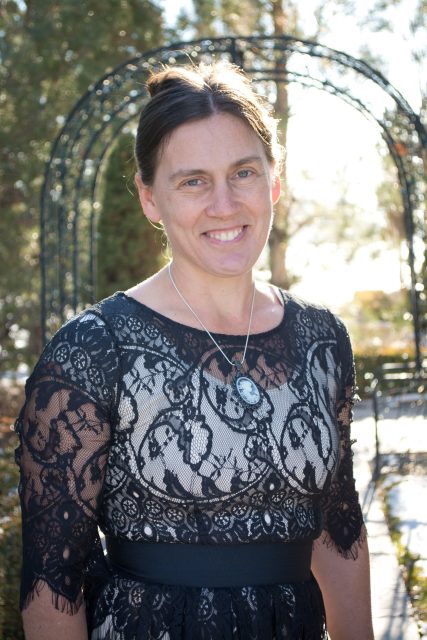 A guest post by Mette Harrison
A guest post by Mette Harrison
On March 24, I attended the first annual conference of Mormon Women for Ethical Government at the Tanner Building on the BYU campus in Provo, Utah. It was a day-long choice of workshops ranging from a tutorial on how to write op-eds to “Immigration Myths” and other activist-themed talks.
It was sold out.
The speakers, all of whom were female, pleaded with women to get involved in government, to run for office themselves, to write to government officials, to join marches, and to consider themselves powerful. They also encouraged members to donate to a drive for diapers for refugees, either by bringing diapers to the event or sending monetary donations online.
Listening to these women talk at the conference and the dinner following, I was impressed with how often they spoke from both sides of the political spectrum. Some thought of themselves as Democrats and cheered for other openly identified Democrats, but they were not necessarily in the majority. Many were Republicans who felt betrayed by their party and no longer saw it as representing their values.
Many spoke about the need to talk about families. Instead of referencing how families looked (nuclear, immigrant, brown-skinned?), they focused on what issues need to be addressed to help all families: alleviating poverty, facilitating access to clean water, restricting guns, preventing abuse, and so on.
A bipartisan commitment to ethics and justice has been a hallmark of MWEG in its first year of history.
Shortly after the inauguration of President Trump in January of 2017, a group of Mormon women came together to work toward more ethical government.
At first, they simply started a Facebook group and invited others to add themselves. None of the original founders of the group had any idea of the magnitude of what they were starting. They imagined it would be dozens, or even a few hundred women.
It now has nearly 6,000 members all over the United States, using civility to navigate the current political landscape, focusing on what brings people together even in a time where politics seems to be about dividing us into rabid, outrage-focused combatants.
In some ways, these women were not the kind of people I might have expected to found a political movement. They were children’s writers, musicians, teachers, stay-at-home mothers, and businesspeople.
But they also were frustrated with what seemed a new lack of ethics in government. One of the mottos of the group, printed on their T-shirts and the postcards they encourage members to write to their Congressional representatives, is “We will not be complicit by being complacent.”
Is MWEG anti-Trump? They insist they are not. They are a non-partisan group but have come out in favor of some things Trump has opposed, such as allowing DACA recipients to remain in the country and permitting immigrant families to remain together. They have drafted numerous official statements, including an “Open Letter to President Trump,” explaining Utah’s history as a state created by refugees who were once rejected by their own government.
Some of the MWEG’s recent actions include:
- A march and email campaign (with BetterDays 2020) to ask for Martha Hughes Cannon, the first woman senator in the country, to be honored with a statue in the U.S Capitol to represent Utah in Washington, D.C.
- Protests on behalf of immigrant mothers who were being deported away from children
- A letter-writing campaign asking for the congressional delegations in many states to reconsider repealing ACA and repair it instead
- Sending kind notes (in the purple color that is now the brand color of the movement) to former U.S. Rep. Jason Chaffetz to get better soon following foot surgery so he could return to D.C. and his job as chair of the oversight committee
- Hosting rallies to promote voter participation and clean air
- Lobbying on Capitol Hill and in various state legislatures
- Writing numerous op-eds
- Organizing phone call and letter campaigns to Congress
 And they’re far from done. This month, MWEG is publishing a new book with By Common Consent Press about their peacemaking principles, titled “The Little Purple Book.”
And they’re far from done. This month, MWEG is publishing a new book with By Common Consent Press about their peacemaking principles, titled “The Little Purple Book.”
There will be an explanation of how the group came into being, as well as an essay on each of the organization’s six principles, which are:
- Peacemaking is proactive and courageous.
- Peacemaking seeks to unify instead of divide.
- Peacemaking demands great tolerance for people and none for injustice.
- Peacemaking views human suffering as sacred.
- Peacemaking chooses love instead of hate.
- Peacemaking believes that ultimate love is not only possible, but sure.
I’m currently working with MWEG as their newsletter writer, and I’ve also attended several rallies. I’m a registered Republican, but couldn’t vote for Trump and have been unhappy with his lack of morality in office. This group has been a great way for me to feel like my opinions matter, and that I can actually do something to help change the world for the better, combined with other women who make me feel like a sister.
If you’re a woman who is interested in joining MWEG, click here.
Mette Ivie Harrison is a novelist, triathlete, and regular guest blogger at Flunking Sainthood.
Other posts by Mette Harrison:
- I have autism . . . and I’m a Mormon
- “Mormon families are forever” shouldn’t be a threat
- 10 reasons Mormons dominate multi-level marketing companies






